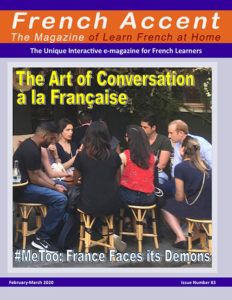Ce qui me plaît, ce que j’aime…
Qu’est-ce que tu aimes en France ? = What do you like/love in France?
Ce que j’aime, c’est la langue, elle est tellement belle ! = What I love is the language, it’s so beautiful!
You have probably heard the French start sentences with ce qui/ce que, especially when answering a question which starts with qu’est-ce qui… or qu’est-ce que... In French grammar, these are called indefinite relative pronouns. They are used to refer to an idea that has already been mentioned. Using them not only makes you sound more like a French native person, but you will see how easy they are to use.
Again, ce qui and ce que both mean “what.”
Ce que is used when it is the direct object of a verb.
Ce qui is used when it is the subject of a verb.
1.One way to know if you have to used ce que or ce qui is to check the word that follows:
─If the word that follows is a verb or a pronoun that is not a subject pronoun (me, te, la, le/l’, lui, nous, vous, leur, les), then you will use ce qui.
Examples:
Ce qui est beau est une vue sur les montagnes. = What is beautiful is a view of the mountains.
Ce qui me rend heureuse est de passer du temps avec ma famille. = What makes me happy is to spend time with my family.
─If the word that follows is a subject pronoun (je, tu, il/elle/on, vous, nous, ils/elles), then you will use ce que.
Examples:
Ce que je préfère, c’est d’aller à la plage. = What I prefer is to go to the beach.
Ce que nous faisons en ce moment est très important. = What we’re doing now is very important.
Je ne savais pas ce que je devais faire. = I didn’t know what I had to do.
Note that ce que becomes ce qu’ in front of a vowel.
Example:
Ce qu’on aime. = What we love.
2. Another clue is the question itself.
If you hear qu’est-ce qui….’, then you can respond with ce qui…
If you hear qu’est-ce que/qu’…, then you can respond with ce que or ce qu’.
Let’s clarify with these examples, with answers following the questions:
Qu’est-ce que vous faites le matin ? = What do you do in the morning?
– Ce que je fais change selon le jour. = What I do changes according to the day.
You will notice the ce que is followed by a subject pronoun and a verb: je fais.
Qu’est-ce qu’elle aime faire ? = What does she likes to do?
– Ce qu’elle aime faire est de la planche à voile. = What she likes to do is windsurfing.
Qu’est-ce que tu dis ? = what are you saying?
– Je dis ce que je pense ! = I say what I think!
Qu’est-ce qui te motive à vivre en France ? = What motivates you to live in France?
– Ce qui me motive est la qualité de vie qu’on peut avoir avec la famille. = What motivates me is the quality life that we can have with family.
You will notice how ce qui is followed by the pronoun me.
Qu’est-ce qui vous rend heureux dans la vie ? = What makes you happy in life?
– Ce qui me rend heureux est de donner aux autres. = What makes me happy is to give to others.
Qu’est-ce qu’on va apporter chez nos amis ? = What are we going to bring to our friends?
– Ce qu’on va apporter à nos amis dépend de ce qu’on va trouver. = What we’re going to bring to our friends depends of what we’ll find.





 Improve your French aural comprehension, your French writing skills or your grammar knowledge. Communicate with ease and confidence when traveling in France… Our ebooks have helped thousand of French learners. Ebooks with audio, exercices, short stories, etc.
Improve your French aural comprehension, your French writing skills or your grammar knowledge. Communicate with ease and confidence when traveling in France… Our ebooks have helped thousand of French learners. Ebooks with audio, exercices, short stories, etc. Receive our French Learning e-Magazine for FREE!
Receive our French Learning e-Magazine for FREE!